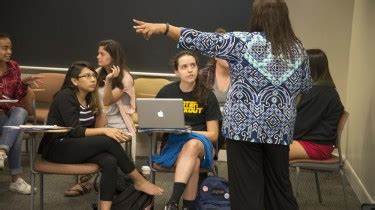(单词翻译:单击)
听力文本
Largest Public University in US Requires Ethnic Studies
California State University has approved a vote requiring all students to take an ethnic and social justice studies class in order to graduate.
The decision came in late July from the largest public university system in the United States, commonly known as Cal State.
The change is set to take effect in three years. The decision comes in the middle of a national reckoning over systemic racism and police abuse. It represents the first change to the school's general education program in more than 40 years.
The state Legislature is also considering a bill to require ethnic studies. However, it would not include social justice classes. If passed and signed by California's governor, the measure would overrule the action by California State University. School leaders have denounced this possibility, saying it would interfere with university decision-making.
State lawmakers still have to examine small changes to the bill before it could be sent to Governor Gavin Newsom.
The plan approved by California State University lets students choose from different ethnic studies subjects to meet the requirement. Cal State's selection is wider than the state bill.
Students at Cal State, for example, can take social justice courses that explore such issues as the criminal justice system and public health inequities.
Chancellor Timothy White is among the leadership at Cal State. Before voting in favor of the class requirement, he said, "It's grounded in ethnic studies, but it is broader, more inclusive, gives students choice."

Lawmaker Shirley Weber is a San Diego Democrat and former professor. She wrote the Legislature's bill. The university's trustees and state lawmakers agree on the need for more ethnic studies. But Weber and supporters of her proposal say permitting social justice classes makes the university's plan weaker.
"This is not a requirement for ethnic studies," trustee Silas Abrego said before the vote. He was one of the few members to vote against the Cal State plan. Instead, he favors Weber's bill.
He said the ethnic studies professors were not included in discussions about the proposal.
Weber's bill would take effect in the 2021-2022 school year. It would require students to take a class centered on Native Americans, African Americans, Asian Americans or Latina and Latino Americans.
The university's proposal would take effect in the 2023-2024 school year. The university's plan would cost $3 million to $4 million, while the state bill is estimated to need $16 million.
Tony Thurmond a top official for public education in the state. He is also on the Cal State University board. He voted against the university's proposal. He spoke in favor of the state bill's method that centered on the four ethnic studies subjects.
Weber, who leads the Legislative Black Caucus, has written that her bill was needed because the university was too slow to act. It announced ethnic studies plans almost five years ago.
Weber noted that the California Faculty Association, a labor union, supports her bill. The group represents 29,000 professors at California State University. It has said the aim should be teaching students about the experiences of minorities and people of color in the United States.
Trustee Lateefah Simon called the school's proposal thoughtful and detailed, but she voted against it. She said its "social justice umbrella" plan might cause students to miss out on ethnic studies education.
I'm Alice Bryant.
重点解析
重点讲解:
1. in order to 目的;为了……起见;
In order to do this, we need your help..
为了达到这个目的,我们需要你们的帮助。
2. such as 比如;像这种的;
Trees such as spruce, pine and oak have been planted.
种植了云杉、松树和橡树等树木。
3. agree on 同意;对……取得一致意见;
The two sides failed to agree on the wording of a final report.
双方未能就最终报告的措辞达成一致。
4. miss out 漏掉;错过机会;
We're missing out on a tremendous opportunity.
我们在坐失良机。
参考译文
美国最大的公立大学要求学生学习种族研究课程
加州州立大学通过了一项投票,要求所有学生都必须参加种族和社会公正研究课程才能毕业。
美国最大的公立大学系统(人们常常称其为加州州立大学)于7月下旬做出这项决定。
这项改变将在三年后生效,这项决定是考虑到全美的系统性种族主义和警察滥用职权而做出的。这是40多年来,学校通识教育课程第一次进行改变。
州议会也在考虑一项要求学习种族研究课程的法案,但不包括社会公正阶层研究的课程。如果加州州长通过并签署该法案,加州州立大学的操作将被否决。学校领导斥责这种可能性,称这将干扰大学的决策。
州立法者将该法案送交州长加文·纽森之前,仍需审查对该法案进行的微小修改。
这项由加州州立大学批准的计划,允许学生从不同的民族研究科目进行选择,以满足必要条件。加州大学的选择比州法案的范围更广。
例如,加州州立大学的学生可以参加社会公正课程,探讨刑事司法制度和公共卫生不平等问题。
大学校长蒂莫西·怀特是加州州立大学的一名领导,在投票赞成课程要求前,他表示:“这是基于种族方面的研究,但它范围更广泛,包容性更强,给学生们提供了选择。”
立法者雪莉·韦伯是圣地亚哥民主党人,也曾是一位教授。她起草了立法法案,大学校董和州立法者一致认为有必要进行更多的种族研究。但是,韦伯和支持她提议的人表示,允许开设社会公正课程会削弱大学制定的计划。
“这不是对种族研究的要求,”大学理事塞拉斯·阿布雷戈在投票前说。他是少数投票反对加州州立计划的议员之一。相反,他赞成韦伯的法案。
他说,民族研究教授并未参与有关这项提案的讨论。
韦伯的法案将在2021-2022学年生效,它将要求学生参加一个以美国原住民、非裔美国人、亚裔美国人或拉丁裔美国人为中心的课程。
该大学的提议将在2023-2024学年生效。该大学计划将耗资300万至400万美元,而州政府的预算估计需要1600万美元。
托尼·瑟蒙德是该州公共教育的最高官员,他也是加州州立大学董事会成员。他投票反对大学的建议,赞成州法案的方法,即以四个民族研究科目为中心。
韦伯是立法会黑人核心小组的负责人,她曾写道,她的法案是必要的,因为大学在采取行动方面过慢,它在五年前就宣布了种族研究计划。
韦伯指出,加州教师协会(为一个工会)支持她的议案。该组织代表加州州立大学的29000名教授,其目标应该是教授学生美国少数民族和有色人种的经历。
理事拉特法·西蒙称学校的建议考虑得周全、细节详尽,但她投了反对票。她表示,其“社会公正保护伞”计划可能导致学生错过民族研究教育。
爱丽丝·布莱恩特报道。
译文为可可英语翻译,未经授权请勿转载!


